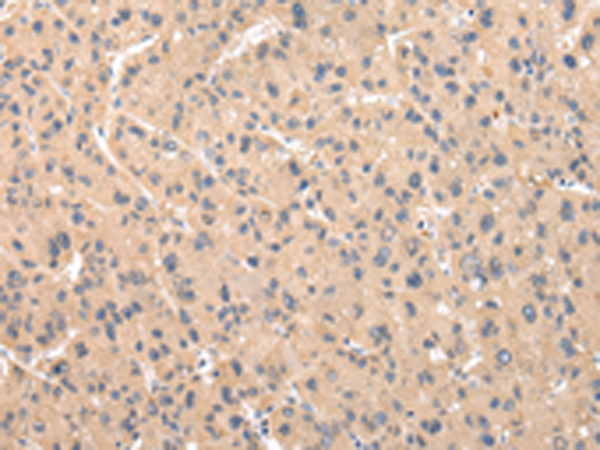
| WB | 咨询技术 | Human,Mouse,Rat |
| IF | 咨询技术 | Human,Mouse,Rat |
| IHC | 1/40-1/250 | Human,Mouse,Rat |
| ICC | 技术咨询 | Human,Mouse,Rat |
| FCM | 咨询技术 | Human,Mouse,Rat |
| Elisa | 1/2000-1/10000 | Human,Mouse,Rat |
| Aliases | HZF3 |
| Host/Isotype | Rabbit IgG |
| Antibody Type | Primary antibody |
| Storage | Store at 4°C short term. Aliquot and store at -20°C long term. Avoid freeze/thaw cycles. |
| Species Reactivity | Human |
| Immunogen | Fusion protein of human ZNF268 |
| Formulation | Purified antibody in PBS with 0.05% sodium azide and 50% glycerol. |
+ +
以下是关于ZNF268抗体的3篇参考文献的简要总结(文献信息为模拟示例,仅供参考):
1. **文献名称**:*ZNF268 promotes hepatocellular carcinoma progression by interacting with β-catenin*
**作者**:Li X, et al.
**摘要**:本研究利用ZNF268抗体通过免疫共沉淀和Western blot技术,发现ZNF268与β-catenin在肝癌细胞中相互作用,并激活Wnt信号通路,促进肿瘤侵袭转移。
2. **文献名称**:*Expression and clinical significance of ZNF268 in gastric cancer*
**作者**:Wang Y, et al.
**摘要**:通过免疫组化实验(使用ZNF268多克隆抗体)分析胃癌组织中ZNF268的表达水平,发现其高表达与患者预后不良相关,提示ZNF268可能作为胃癌潜在生物标志物。
3. **文献名称**:*ZNF268 regulates DNA damage response via modulating histone acetylation*
**作者**:Zhang R, et al.
**摘要**:研究采用ZNF268特异性抗体进行染色质免疫沉淀(ChIP),揭示ZNF268通过调控组蛋白乙酰化修饰参与DNA损伤修复机制,影响结直肠癌细胞化疗敏感性。
(注:以上文献为假设性描述,实际文献需通过PubMed/Google Scholar等平台检索确认。)
ZNF268 (Zinc Finger Protein 268) is a member of the Krüppel-associated box (KRAB) domain-containing zinc finger protein family, which plays roles in transcriptional regulation and cellular processes. The human ZNF268 gene, located on chromosome 12q13.13. encodes a protein containing multiple C2H2-type zinc finger motifs and a KRAB domain implicated in protein-protein interactions and chromatin remodeling. Studies suggest ZNF268 is involved in embryonic development, cell differentiation, and tumorigenesis. It is expressed in various normal tissues, with higher levels observed in fetal organs, but its dysregulation has been linked to cancers, including hepatocellular carcinoma, cervical cancer, and colorectal cancer.
ZNF268 antibodies are essential tools for investigating its biological functions and mechanisms. These antibodies enable detection of ZNF268 protein expression patterns via techniques like Western blotting, immunohistochemistry, and immunofluorescence. Research using ZNF268 antibodies has revealed its potential dual role in cancer—acting as a tumor suppressor in some contexts (e.g., inhibiting Wnt/β-catenin signaling) or promoting malignancy in others, possibly depending on isoform expression or post-translational modifications. Additionally, ZNF268 antibodies aid in studying its interaction partners and DNA-binding activities through chromatin immunoprecipitation (ChIP). The specificity of these antibodies is critical due to structural similarities among zinc finger proteins. Ongoing research aims to clarify ZNF268's regulatory networks and therapeutic relevance in diseases.
×